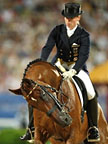|
Editorials
27th February 2009 - Judging at the Edge
 The judging system in the dressage world is in a crisis. How can a horse that shows obvious and multiple resistance at the Olympics in Hong Kong win the individual silver medal? How can an Olympic champion who rides a freestyle to the wrong music score up to 83% on an artistic level. How come this rider receive over 80% from all five judges, while she executed not a single movement to the right music? How can dressage be developed internationally if the FEI Dressage Committee consists of four judges out of six members in total? Since the summer of 2008, a tornado has swept through dressage world leading to the resignation of the entire FEI Dressage Committee and the profound questioning of the judges' system. The judging system in the dressage world is in a crisis. How can a horse that shows obvious and multiple resistance at the Olympics in Hong Kong win the individual silver medal? How can an Olympic champion who rides a freestyle to the wrong music score up to 83% on an artistic level. How come this rider receive over 80% from all five judges, while she executed not a single movement to the right music? How can dressage be developed internationally if the FEI Dressage Committee consists of four judges out of six members in total? Since the summer of 2008, a tornado has swept through dressage world leading to the resignation of the entire FEI Dressage Committee and the profound questioning of the judges' system.
Joep Bartels, conceptual creator of the World Cup and Kur to Music, wrote a stirring column in the Dutch equestrian newspaper De Paardenkrant mid January 2009. He explained the mental process which took place in the judges' mind while scoring Anky's mismatch kur at the CDI-W Mechelen. A trained psychologist, Bartels said that "the (un)conscious striving for unity of opinion leads to people using unconscious 'anchor points' as parameters. These anchor points distract the attention from what happens right in front of their nose. 'Memory' is such an anchor point. For judges it is sometimes impossible to constantly distance themselves from these processes."
What Bartels explained on a psychological level, us, laymen, refer to as Anky or Isabell-points, i.e. extra marks given purely based on reputation and high rank of the rider. Albeit, an ethical judge should be very much aware of what he's doing and in principal each rider should be judged tabula rasa.
Bartels encapsulated the major problem with the judging system as follows: "The problem is the system, not the judges. A good "code of points" and regulated influence through functional rules and control by independent arbiters will support the judges and not weigh down on them."
The FEI Dressage Task Force has taken it at heart to change the system. Two of five terms of reference they have set out to explore should develop and improve the judging system. . As mission statements they claimed to "review the issues surrounding the very significant area of the training and development, assessment and selection of judges for major championships and Olympic Games; review as part of this development of randomized/ computerized judge selection process" and "the fitness for purpose of the method of judging dressage competitions needs thorough review – both in terms of the number of judges, their positioning and the judging process"
Bartels is a proponent of an assessment system for the judges' proficiency. There should be a systematic evaluation system for judges before and after a show. "Judges who have made big mistakes should be demoted to judging (temporarily) smaller, less important competitions and when this happens at big championships they should even be removed from the competition," he recommended. In dressage there is no independent control of judges because the technical delegate is usually a judge himself. "Self control is no control," Bartels explained.
At the 2008 Global Dressage Forum, Dutch Broadcast company reporter (NOS) Hans van Zetten stressed the importance of a "code of points" for a judging system. Even though the "FEI Judges Handbook" is a first attempt to be such a manual, it fails in accurately describing a clear point system for the each variable execution of a movement.
French dressage master and international judge Colonel Christian Carde is a supporter of gathering judges into an international society which determines which judges are sent to which competition, instead of sponsors (!!!!) of the usually smaller international shows deciding which judge will attend the event. The Task Force aims for a computerized, at random system to appoint judges to shows.
Dutch Kur composer Cees Slings claims to be developing a new system which will prevent any judging lapses, such as the Mechelen fiasco, to happen ever again. EQ-MuSync is the computer program Slings is creating and he compares it to the Hawk Eye system now institutionalized at international tennis competitions. According to Slings, EQ-Musync is "a new complete measuring instrument for Freestyle dressage. It will wipe away all "gray areas" of adjudication: subjectivity versus objectivity; relation to musical taste; lack of knowledge of music and rhythm and evaluation of synchronicity. All these unquantifiables dissappear with EQ-Musync." The program sounds interesting but it is at the moment still in a fetal phase.
To conclude, Eurodressage would like to share with you that Col. Carde has a clear view on the reformation of the judging system. His opinions will be revealed on the website in the near future. At a symposium in the U.S.A. in the fall of 2008, Carde interestingly remarked, "why not have judges on the warm-ups ? It is so frequent that thirty minutes of forced work are the key to five minutes of pretended happiness."
I'll leave you with that thought for now...
-- Astrid Appels
View our archived editorials here
|
